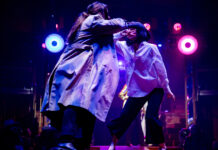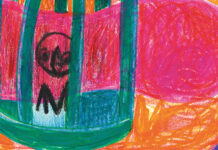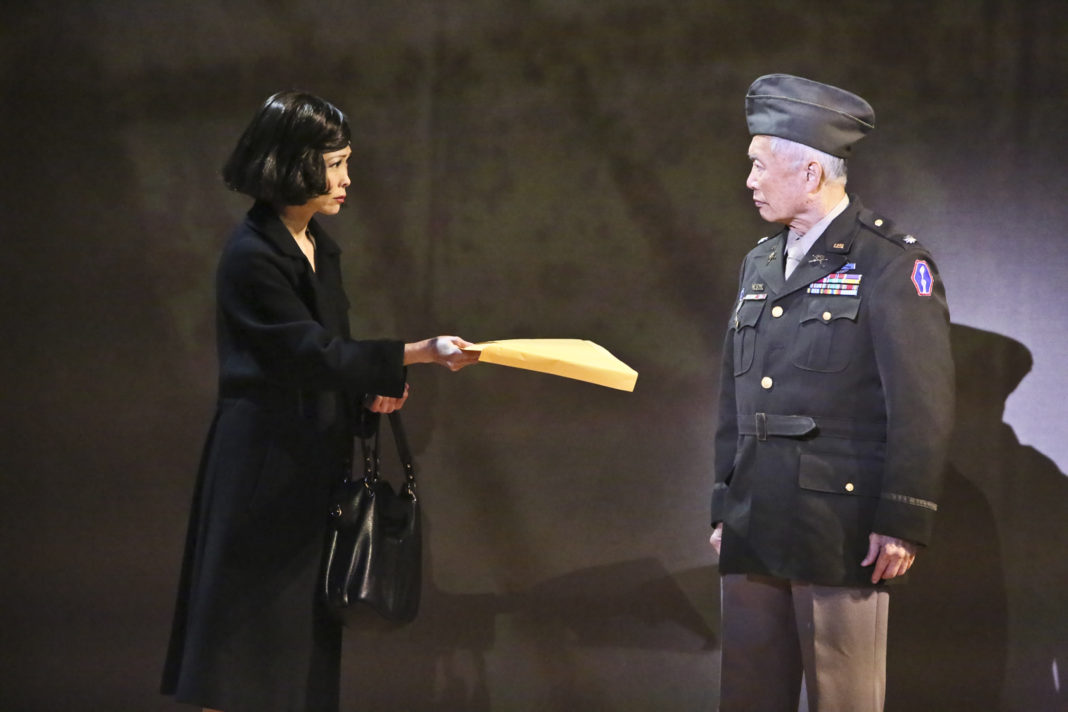It was nearly five-and-a-half years ago that the world premiere of the musical Allegiance took place at the Old Globe in San Diego. The show, written by Jay Kuo, Marc Acito and Lorenzo Thione is set in America after the bombing at Pearl Harbor. President Roosevelt signs Executive Order 9066 and in its wake 120,000 Japanese-Americans are rounded up and put in camps. Amongst those who lived through his awful part of American history is the musical’s star, George Takei.
Of course most people know Takei for his role as Sulu on Star Trek. But anyone who has followed the journey of this musical knows that telling this story – his family’s story – is of paramount importance to the iconic actor who will turn 81 in April.
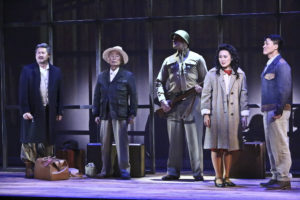
After the world premiere in San Diego, where Takei said the show broke records, Allegiance went to Broadway where it had a brief run, closing after 111 performances in 2015-2016. The musical was filmed before it closed at the Longacre Theatre and has been screened around the country.
The montage below is from the Broadway production.
I recently spoke to Mr. Takei just after opening night of Allegiance which is currently playing at the Aratani Theatre through April 1st. (Though Mr. Takei did reveal an extension is already being discussed.)
In a recent interview for this production you stated that “young people are the future of society and what Allegiance has to teach is about the mistakes of the past.” When you see what’s going on with the gun control debate after the horrific shooting in Parkland, do you feel encouraged that young people are realizing the future is in their hands?
Indeed. As a matter of fact, when the current president had one of his earliest executive orders it was the Muslim travel ban. When Donald Trump signed that order thousands of young people rushed to the airport to protest that order. Acting Attorney General Sally Yates refused to defend it. [Yates was dismissed by Trump for her actions.]
When 9066 was signed by Roosevelt, every elected official went along with it except for one, the Governor of Colorado [Ralph Lawrence Carr]. He was the only one who stood up and said “this is not right. This is not the American thing to do.” We have made amazing progress in the 75 years since then.
You just had your opening in the same city in which you and your family were rounded-up – Los Angeles. What kind of emotions or satisfaction does bringing this show to Los Angeles offer you?
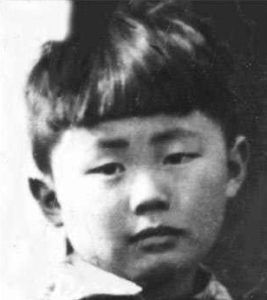
This is where the story really belongs. This is where my story began. Southern California has the largest concentration of Japanese Americans. It also has the greatest number of people and families who were touched by the internment. Leaders in the Japanese-American community, which was the immigrant generation, were immediately taken away. The executive order was signed on February 19, 1942 and in May our family was ordered out of our home and taken to Santa Anita where we were temporarily put in horse stalls. Innocent people with no due process. No charges. No trials. We were ordered out of our homes at gun point.
You tell a lot of your story in a TedTalk. You also share some of your father’s wisdom there. How much is he an inspiration for how you play your role in Allegiance?
It’s really a tribute to my father. In the last scene I’m really thinking of him. I have one regret that’s haunted me and we use that in the last act. I was too young to understand the internment when I was in the barbed wire prison camps, so I had my dinner conversations with my father. This was particularly because I read about the shining ideals of American democracy in my civics books and I couldn’t reconcile that with my childhood imprisonment. In one heated discussion I said “you lead us like sheep to slaughter when you took us to the camps.” Suddenly that conversation stopped and I realized I had gone too far. That silence seemed to go on forever. He walked into his bedroom and closed the door. I wanted to knock on the door and apologize. I thought I’d wait until tomorrow and then the next day was more awkward. He let it eventually fade away from us. The fact that he passed away and I can’t do it anymore really pains me. We worked that into the final speech I have.
Have you ever come to peace with both the internment and your comments to your father?
I am at peace with it now. I know that my father understood. Japanese fathers are a special breed I think. They understand and they show it in other ways. He understood me. He showed me he had forgiven me without saying so. That silent paternal understanding. But I was the one who was never able to apologize. That made me feel very guilty, despite I felt he understood.
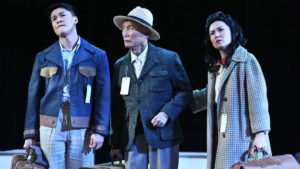
Allegiance has had mixed success both critically and commercially, yet you persevere with the show. Why?
The major thing I feel about my life with Allegiance is enormous fulfillment. It’s been my mission in life. I’m always taken aback by people I consider to be well-read and well-informed who, when I tell them about my imprisonment, are shocked. It’s something we should be as familiar with as our slave history. It’s been my mission to make people aware of that history so that we try to avoid something like that happening again. Of course, we’re repeating it again with a different populace.
The most profound way to reach people is through their hearts. I always thought of writing a drama about the internment. Jay Kuo said it had to be a musical because musicals hit the heart so profoundly. Of course, being a musical theatre fan I knew exactly what he meant.
It seems the best song about racism from a Broadway musical is in South Pacific with “You’ve Got to Be Carefully Taught.” That show debuted in 1949 on the heels of World War II. How far have we come since then?
It comes slowly, doesn’t it? What happened in Charlottesville, it’s in the DNA of the United States. “All men are created equal.” Those words were written by great Americans: George Washington, Thomas Jefferson. They were great Americans that established the shining ideals, but they also kept other human beings as slaves.
Racism is imbedded deep inside the American soul. Dr. King used to say that “racism is a part of America.” We’re still doing battle with that. It’s part of our constant struggle.



